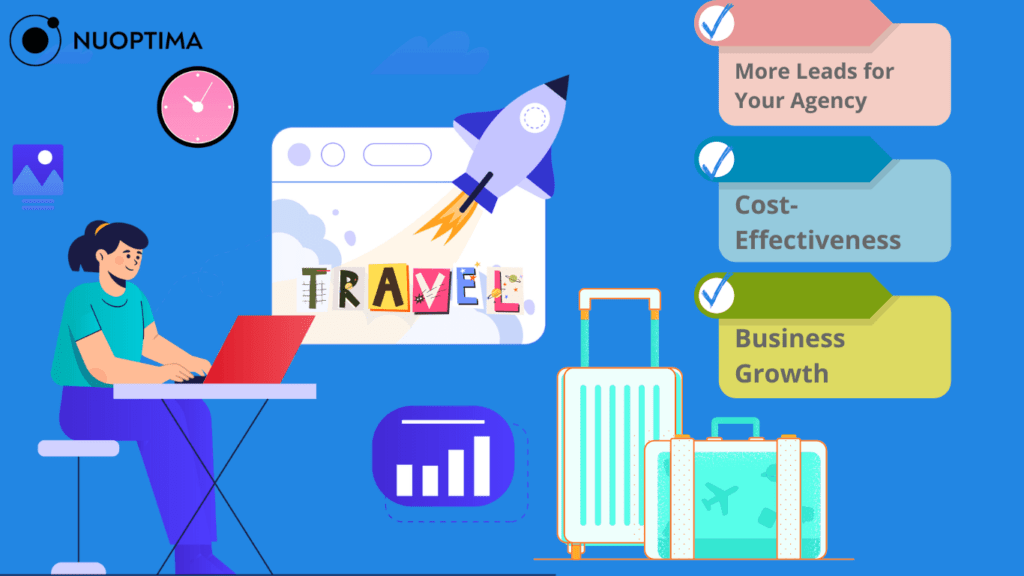Boosting Your Travel Agency’s Online Visibility
Picture this: as a travel agent, imagine your travel agency’s travel services website ranking prominently among Google’s top search results on engine results pages (SERPs). The possibilities are endless, especially when travel SEO techniques such as link building enhance how search engines understand your website, ensuring clear contact details improve search engine rankings, a feat more challenging with traditional advertising methods.
With a world reopening its doors to wanderlust, mastering digital marketing and SEO for your travel agency using tools like Google Keyword Planner, Google Trends, and a free google business profile is essential for driving targeted traffic, and travel services can be enhanced by partnering with a travel agent. More than ever, travelers are online, and they frequently rely on search engine results pages, local searches, and local landing pages optimized for local SEO to find the best vacation packages and travel options offered by tour operators, making a robust marketing strategy crucial for success.
Standing out in a sea of major players like Expedia and Tripadvisor, as well as other notable travel related services and websites, requires optimizing your service pages, page titles, and web pages strategically and effectively through travel SEO techniques like Google Maps integration, link building, and utilizing quality backlinks, a challenge where a skilled travel agent can provide valuable insights.
Understanding SEO for Travel Agencieso
SEO, or search engine optimization, is crucial for travel agencies, including any travel agent offering travel services, seeking success.
At its core, SEO involves tailoring your website in a way that makes it more attractive to search engines, thereby garnering higher rankings on search results pages. Travel agencies, along with individual travel agents, face considerable competition, and appearing on the first page is a significant advantage as travelers often do not look past these top results.
Effective SEO strategies include identifying and implementing relevant keywords, ensuring mobile compatibility, and creating high-quality, informative content tailored to potential clients’ needs. High search volume keywords can drive significant organic traffic to a travel website, making their strategic use essential.
Moreover, SEO helps establish credibility and trust with your target audience, especially crucial for a luxury travel agency or travel agent aiming to attract discerning travelers. By consistently appearing at the top of search results, your travel agency is seen as a go-to source for travel solutions and insights, potentially converting visitors into loyal customers.
A strong grasp of SEO helps travel agencies break through traditional limitations, attract more travelers, and increase their online reach. By optimizing meta descriptions and using meta tags effectively, your agency can improve visibility, stay competitive, and drive long-term growth in the travel industry.
How to choose an SEO company is a frequently asked question. Check out our webinar to understand the metrics people use when choosing an agency, including a travel agency.

Importance of SEO in the Travel Industry
The travel industry is experiencing a paradigm shift; digital presence is now indispensable for capturing potential clients, especially as travel companies increasingly prioritize travel SEO on online platforms for growth.
In a 2023 survey, nearly 70% of travelers admitted using search engines as their primary planning tool. Amidst such reliance on digital platforms, ensuring your agency’s website ranks high on search engine results pages (SERPs) becomes crucial to reach this audience.
It is no longer sufficient for a travel agency to solely rely on traditional advertising methods; an SEO-focused approach fosters organic traffic flow from users actively seeking your services. By tailoring strategies specifically to search-intent, your agency becomes more visible, accessible, and appealing to potential travelers.
SEO directly impacts an agency’s growth by turning website visitors into potential clients and boosting visibility in search results. Agencies that use SEO well not only secure top rankings but also improve conversion rates and strengthen brand recognition.
Incorporating SEO into your marketing mix is pivotal, offering a competitive edge essential for sustaining and expanding your travel agency’s customer base, especially when supported by an experienced travel agent.
Now, don’t get us wrong, we’re not against PPC. We at NUOPTIMA have helped our clients generate six figures with Google Ads. Check out our Icy Bear case study.
Navigating Competition in Travel SEO
Travel SEO demands a long-term, strategic approach. For travel agents, success comes from building a solid keyword strategy and aligning content with user intent. By focusing on niche audiences often overlooked by larger agencies, you can attract more relevant traffic and turn visitors into loyal clients—driving consistent growth over time.
Moreover, adaptability in content marketing serves as a powerful differentiator in this journey. By staying attuned to evolving search algorithms, new travel trends, and emerging technologies, you position your agency to nimbly navigate shifts—remaining always one step ahead of the competition.
Therefore, effective competitive SEO, including technical SEO techniques, requires a combination of diligent research, creative content strategies, and continuous optimization, making it essential for any travel agent to stay informed and proactive. By embracing these core elements, your travel agency can not only withstand the fierce competition but also thrive, fostering an online presence that captures the imagination and loyalty of travelers worldwide.
Effective Keyword Strategies for Travel Agencies
Effective keyword strategies, including the integration of target keywords and travel related services, allow agencies to stand out, attract, and maintain a dedicated clientele by addressing specific traveler needs.
Identifying relevant keywords, including long-tail keywords, through keyword research is about understanding what potential travelers are searching for.
Therefore, research tools like Ahrefs and Semrush can illuminate trends related to your marketing strategy, highlighting often-overlooked opportunities.
Furthermore, long-tail keywords, such as “luxury eco-friendly resorts in Bali,” can capture high-intent travelers. These highly specific keywords have lower competition, making them easier to rank for in search results, which is particularly advantageous for niche travel services.
When crafting content, integrate keywords naturally, enhancing readability while maintaining alignment with search intent and user expectations. The key is balance—ensuring your content is engaging and informative.
Lastly, don’t shy away from using voice search’s rise to your advantage. Crafting conversational keyword phrases can help you feature prominently in this growing search segment.
Enhancing On-Page SEO Elements
Embarking on the journey of on-page SEO, understanding the foundational elements of technical SEO is vital to enhancing your site’s visibility and reach.
The headline of each page must serve as a magnetic invitation, captivating potential clients. Creative headers, submerged with primary keywords, mirror user intent and profoundly enhance engagement metrics. Clear, concise, and evocative headlines act like tour guides, directing users towards the thrilling landscape of your travel offerings.
Additionally, engaging content is the cornerstone of a successful optimization strategy. By weaving compelling narratives, enriched with rich media and accessible formatting, your website becomes a holistic experience that invites continued exploration and urges conversion.
Ultimately, the integration of structured data significantly augments how search engines understand your page. By utilizing schema markup, you pave the road for search engines to meticulously index every unique aspect of your travel agency, facilitating improved rankings and enhanced visibility in the ever-competitive digital battleground. Structured data also helps improve search visibility and click-through rates by providing search engines with specific information about services offered.
Boosting Visibility with Internal Links
Internal links play a crucial role in enhancing your site’s navigation and SEO impact. By connecting related pages, you encourage users to explore more content.
These links guide both users and search engines through your website seamlessly. They help establish a hierarchy, signaling the most important pages.
Well-strategized internal linking also aids in distributing page authority across various sections. This, in turn, improves search engine understanding of your site’s structure, boosting your overall visibility.
By linking relevant content, customers stay engaged, increasing dwell time and reducing bounce rates—a positive signal to search engines. Envision internal links as bridges that enrich user experience while fortifying your page hierarchy against the challenges of search engine algorithms. Additionally, don’t hesitate to implement “breadcrumbs” to showcase your site’s ordered structure.
Mobile Optimization for Travel Websites
As digital device usage skyrockets, ensuring your travel website is mobile-friendly is no longer optional—it’s essential for success. Improving website loading speed is a crucial aspect of technical SEO, as slow-loading pages can deter users and negatively impact search engine rankings.
For travel companies, a travel agent, and a luxury travel agency, mobile optimization extends to a seamless user experience, enticing travelers who research and book trips on the go. Prioritize fast loading times, intuitive navigation, and mobile-responsive design cards to enhance performance across different devices. Picturesque content and dynamic visuals must be balanced with speed, as overloaded pages hinder user satisfaction.
Importantly, integrating features like click-to-call and location services will enhance local search results and bookings, allowing your travel agent to provide personalized assistance quickly. As potential travelers explore itineraries, a well-optimized mobile site ensures they can effortlessly gather details, see accommodations, and finalize bookings without tech-induced stress.
A well-planned mobile strategy is essential for travel agents aiming to reach new customers. By understanding how users interact on smartphones and tablets, your agency can improve retention and build lasting loyalty among today’s travelers. Is your agency prepared to meet them where they are?
Building Authority with Off-Page SEO
Building authority with travel SEO, including effective link building and utilising travel services, involves leveraging external sites to boost visibility and search engine rankings effectively. The travel industry faces challenges in link building due to its competitive nature, making it essential to adopt innovative strategies to stand out.
The primary focus is on acquiring backlinks from respected websites within the travel industry, strengthening your travel agent’s online reputation. High-quality links from authoritative sources validate your site in Google’s eyes, profoundly impacting your positioning in search results. This strategy is complementary to your on-page efforts, ensuring your content resonates with audiences and search engines alike.
Additionally, fostering relationships with influencers, engaging in social media, and offering comprehensive travel services amplifies your reach. By cultivating genuine connections, your agency not only enhances brand awareness but also garners invaluable endorsements that drive organic traffic and elevate your standing within the travel niche.
To succeed in link building, encourage partnerships through collaborative campaigns, guest blogging, and content sharing initiatives. Such initiatives should be targeted to align with the specific needs of your target audience, effectively harnessing the credibility and influence of established voices. Creating valuable infographics can also encourage other sites to link to your content, further enhancing your online authority.
Watch our video below to learn how to build backlinks on autopilot using tools and embeds, create valuable content, and employ PR tactics.
Leveraging Social Media for Travel Agencies
Capitalize on social media’s extensive reach.
By crafting engaging, visually captivating content, travel agencies and travel agents can ignite wanderlust. Take advantage of platforms like Instagram and TikTok, which thrive on aesthetically pleasing visuals that highlight unique travel experiences. Strategically posting content during peak user activity times can further enhance visibility and engagement, fostering stronger connections with potential clients.
Harness influencers for greater impact in promoting your travel services.
Influencers possess the power to – not only attract droves of potential clients to your travel agent agency – but also convert casual observers into long-term supporters through their third-party endorsements.
With travel enthusiasts eager for breathtaking destinations, social media platforms create a dynamic ecosystem, allowing travel companies to showcase their agency’s offerings creatively. Continually adapting to evolving 2023 digital trends ensures you remain relevant. Authentic storytelling paired with effective social media strategies nurtures meaningful relationships with your audience.
Local SEO Techniques for Travel Agencies
Local SEO empowers travel agencies to target specific geographic areas with precision, helping them attract clients who seek memorable, tailored experiences close to home. Using seasonal keywords can further enhance visibility by attracting traffic during peak travel times and specific events.
Maximize your reach with localized keyword usage.
Integrate geographic terms into your content, such as city names, to enhance search visibility for regional audiences. Ensure your Google Business Profile is fully optimized, leveraging updated photos, descriptions, and positive customer reviews to improve local rankings.
Crafting authentic content that resonates with the local audience is crucial. By delving into detailed guides of nearby attractions or collaborating with local bloggers, you can position your agency as a trusted community resource. Use engaging maps, itineraries, and personal stories to provide a comprehensive understanding of the locale. Regularly updating destination content helps keep it relevant and valuable for travelers searching for up-to-date information.
Build trust and brand loyalty locally by encouraging happy clients to leave positive reviews on Google and other platforms. Respond to feedback to show your commitment to service, and keep content up to date with local events, seasonal offerings, and business hours. This positions your agency as the top choice for local travel experiences.
Content Creation for Traveler Engagement
Engaging with travelers through content involves crafting stories, sharing insights, and creating connections that transcend typical travel experiences. Personal stories, authentic journeys, and vibrant visuals help bridge the gap. The traveler user journey has five stages: awareness, research, decision-making, booking, and travel. Understanding these stages allows you to tailor your content to meet travelers’ needs at every step.
Tailor your content to your audience’s aspirations and preferences, sparking curiosity and wanderlust.
Consider partnering with a travel agent and local influencers to showcase hidden gems, enhancing relatability and trust. Co-create content that leverages their unique perspectives.
Visual storytelling, like vibrant image galleries or breathtaking video diaries, captivates the viewer’s imagination, while enhancing SEO appeal with rich media.
When crafting written content, travel agents should focus on providing value through detailed guides, useful tips, and exclusive insider knowledge that seasoned travelers or soon-to-be explorers would appreciate. Even niche topics, like local cuisine or cultural events, can generate significant engagement when approached with enthusiasm and expertise.
Ultimately, the key to effective traveler engagement lies in authenticity. Immersive experiences depicted through fresh voices encourage long-lasting connections, fostering an interactive community around your travel agency, much like a dedicated travel agent guiding a personalized journey.
Analyzing and Refining Your SEO Strategy
Analyzing your travel SEO, including technical SEO aspects, and marketing strategy involves assessing the effectiveness of your current efforts to determine what’s working and what needs improvement.
Regular audits of your website’s performance allow you to track essential metrics like travel SEO effectiveness, search engine rankings, traffic volume, and conversion rates. These insights inform data-driven decisions that can enhance your strategy by identifying opportunities to optimize for long-tail keywords.
Consider tools such as Google Analytics and Search Console to dive deeply into user behavior and keyword success. Identifying trends will empower you to capitalize on high-performing content and refine underperforming pages.
Watch for changes in search engine algorithms as they can significantly impact your results. Staying informed and adaptable ensures your strategy remains aligned with industry developments and best practices.
Through ongoing analysis, refine your tactics to maintain a competitive edge, maximizing the potential of your travel website’s SEO success.
FAQ
Start with keyword research using tools like Google Keyword Planner. Optimize your site’s titles, meta descriptions, and content. Ensure mobile responsiveness, build backlinks from trusted sources, and keep your Google Business Profile updated. Regularly audit performance using Google Analytics and Search Console.
SEO helps travel agencies improve their visibility on search engines to attract more travelers. It involves using targeted keywords, optimizing site content, and building trust through relevant content and backlinks, helping agencies compete with larger travel platforms.
Choose a platform that supports SEO, mobile responsiveness, and third-party integrations. WordPress, Wix, and Squarespace are strong options due to their flexibility, ease of use, and SEO features.
Focus on a niche, optimize your website for local SEO, use storytelling in content, build a strong presence on social media, and create a mobile-friendly experience. Encourage reviews and use visuals to showcase unique travel experiences.



